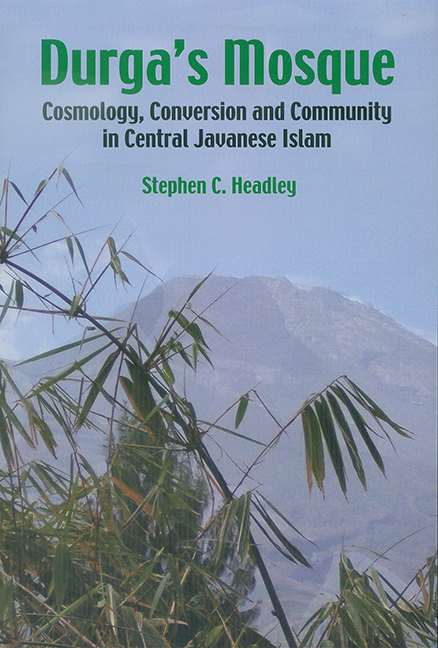Book contents
- Frontmatter
- Contents
- List of Figures
- List of Tables
- Preface
- Acknowledgements
- Introduction: Cosmology, Conversion and Community in Javanese Islam
- PART I THE SOCIOLOGY AND PRACTICE OF RELIGION IN CENTRAL JAVA
- PART II RECONSTRUCTION OF LOCAL RELIGIOUS HISTORY
- PART III INVOKING THE COSMOS, MAGNIFYING ALLAH: STRUCTURING A LANDSCAPE IN THE SEVENTEENTH TO NINETEENTH CENTURIES
- PART IV COSMOLOGY, CONVERSION AND COMMUNITY IN CENTRAL JAVANESE ISLAM TODAY
- Bibliography
- Index
- About the Author
Introduction: Cosmology, Conversion and Community in Javanese Islam
Published online by Cambridge University Press: 21 October 2015
- Frontmatter
- Contents
- List of Figures
- List of Tables
- Preface
- Acknowledgements
- Introduction: Cosmology, Conversion and Community in Javanese Islam
- PART I THE SOCIOLOGY AND PRACTICE OF RELIGION IN CENTRAL JAVA
- PART II RECONSTRUCTION OF LOCAL RELIGIOUS HISTORY
- PART III INVOKING THE COSMOS, MAGNIFYING ALLAH: STRUCTURING A LANDSCAPE IN THE SEVENTEENTH TO NINETEENTH CENTURIES
- PART IV COSMOLOGY, CONVERSION AND COMMUNITY IN CENTRAL JAVANESE ISLAM TODAY
- Bibliography
- Index
- About the Author
Summary
JAVANESE ISLAM IN MONSOON SOUTHEAST ASIA
Since unbiased presentations of a culture and religion foreign to one's own are difficult, the reader needs to be aware of the author's assumptions, those of historical anthropology. The present volume on the development of Islam in Java is the sequel to From Cosmogony to Exorcism in a Javanese Genesis: The Spilt Seed (Headley 2000). The first volume studied the marginalization of a major Javanese origin myth which had begun as a cosmogony, but ended up an exorcism. What had explained the creation of the world and the social relations of mankind and the gods started to be used in a much more private way, for curing persons of their bad destiny. In this second volume the accent is no longer on the Javanese half-man myths, cosmogonies used to compensate for personal and social lack of fulfilment, but the introduction and eventual encompassment of the Javanese pantheon by a “higher” God, Allah, who eventually plays the principal role in the restoration of social and personal wholeness. In fact, the very nature of social and cosmic wholeness for the Javanese changes with Islamic monotheism. The norms which the socio-cosmic “fit” guarantees are slowly being replaced by another hierarchy of values.
By describing two very different kinds of holism, Javanese and Muslim, and the growth of individualism in both of them, one can see the overall coherence, indeed the simplicity of Javanese social morphology. Our task is therefore an ethnographic one. Here we will try to explore not only religious praxis, but how a village, a social community, with a sacred forest called Krendawahana which had become the site of the royal cult of Durga, north of the Central Javanese palace city of Surakarta, later became just another Javanese “Muslim village with a minor offering site behind its mosque”. The Javanese were aware of foreigners coming to Java from the outside world, from “other shores” (sabrang), well before they encountered Islam. But during what Anthony Reid (1993, Vol. II, Ch. 3), has called the age of commerce (1450–1680), there occurred a religious revolution during which half the population of Southeast Asia adopted a monotheism.
- Type
- Chapter
- Information
- Durga's MosqueCosmology, Conversion and Community in Central Javanese Islam, pp. 1 - 54Publisher: ISEAS–Yusof Ishak InstitutePrint publication year: 2004

